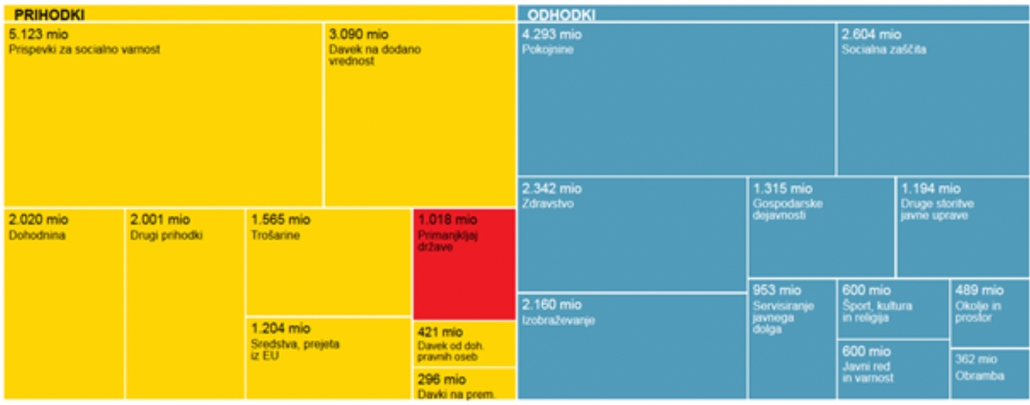 Follow Jorg K. Petrovic on Twitter
Follow Jorg K. Petrovic on Twitter
Slovenia is making a good progress in opening its data. The only area that is left behind is the data about the budget. But recently things are starting to develop rapidly also at the Ministry of Finance. Two years ago, the citizens budget was introduced. And in early 2019, activities started to open as much data as possible in a timely and user attractive and friendly manner. Decisively, coordination between the MoF, the Ministry of Public Administration (in charge of the IT cloud), Governmental PR services and the Court of Audit, has begun. As these institutions started to work on the project, promising outcomes are on the horizon.
1. Slovenia, as a member of the European Union, is obliged to develop a strategy on open data (EU regulation is behind that).
2. Slovenia reports to the EU and public institutions are evaluated about open data. Last report shown improvements, making Slovenia move from the 2nd group »Fast trackers« to the top #1 group of »Trendsetters« (as shown on the graphic, Slovenia holds the 7th position within the whole list).

3. We have many portals where info about open data (and also the very data sets themselves) is to be found:
– OPSi (Odprti Podatki Slovenije “ Open Data Slovenia)
– Manual on how to open the data.
– Register of the entities that are bound by the Public Information Act, not just when being asked but also to be proactively transparent.
– Publication of public sector transactions by the Public Payments Administration of the Republic of Slovenia.
– The Commission for the Prevention of Corruption’s public sector financial transactions records ERRAR, formerly known as Supervizor.
– Publication of metadata on public procurement for reuse.
– Annual reports of political parties (within JOLP “ Javna Objava Letnih PoroÄil “ Public Publication of Yearly Reports).
– All papers of governmental sections
(http://www.vlada.si/delo_vlade/gradiva_v_obravnavi/ ; http://www.vlada.si/delo_vlade/dnevni_redi/ ; http://www.vlada.si/delo_vlade/seje_delovnih_teles/ )
– Transparency and open data “ info by MPA.
Looks like a significant amount of information, but only experts could make a complete assessment and I am not one of them in this field of open data. But I do know about budgets and I can say that other countries have more on budgets. Maybe after all the MPA website might not be at the top address for fiscal data? Sure some useful links are to be found there (ERRAR and OPEN DATA SLOVENIA) but in my opinion they lack direct link to the budget data! Through the presentations and discussions I have witnessed and been part of at GIFT meetings, I know there is a great room for improvement. I believe that, because I know that the evaluation I was presented (before mentioned EU – Open data maturity ) is only one of many. Just last week, OECD has published a new Open Government Data Report and in that case, Slovenia is below average “ way behind South Korea, France, Japan, Great Britain and Mexico.

But I do not want to leave you without fiscal information. Let me just briefly take you to the webpage of the MoF. There, among other things, one can also find the following information:
Citizens budget. All budgets in detail. Where does your money go?

The Tax office gives once a month information on collected taxes.
So, there is valuable information. But that is basically it. Some data can be found at the Statistical office (SURS). But statistics is, as it should be, aggregated information that does not allow to trace budgets (https://www.stat.si/StatWeb/Field/Index/1).
As you can see, Slovenia has data available, but we are still not even halfway compared to where some countries already are.
I think that »Where does your money go« could be a good point to start. But it should be the base to build up a system to provide online, up to date, budget data “ both on income (tax office) and expenditure data (MoF – directorate of budget and directorate of public accounting). Transactions should get direct links to the documentation (data provider through ERRAR and Public Information Act), which could be achieved by using GIFT´s Open Fiscal Data Package, for instance. All data about transactions that result in assets should be presented with the data of those assets (parcel ledger data, geo location, etc.) We already have all the data – since otherwise linear ministries would not be able to function. I also believe that we have all the necessary legislation (Public Information Act, etc.). We only need a person at MoF (like 3 in Mexico) to organize all the pieces of the puzzle in the proper way “ and of course political support for that. Another option would be to work closely with the GIFT network, as it provides technical support for these type of challenges.

